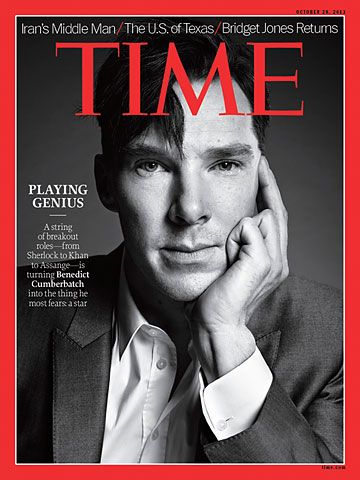
(3 of 4)
PLAYING ASSANGE
Cumberbatch's startlingly accurate Assange, a blend of bombast and beguilement, is no cat-stroking international man of demystification but a characterization that's far more complex. Even Assange acknowledged Cumberbatch's good intentions in his e-mail heard round the world. "[I have] examined your previous work, which I am fond of," he wrote. But in the end, Assange said, "your skills play into the hands of people who are out to remove me and WikiLeaks from the world."
Cumberbatch has put a lot of thought into the charge. "I've never been an activist," he says, "but I've always been politically aware. I protested against budget cuts and cuts to education. I marched against the Iraq War. All that protesting was just swept aside to pave the way for an illegal war, and the results of that war were made very, very plain by those leaked war logs."
The Fifth Estate does an admirable job demonstrating the pressure Assange was under while preparing the leak of almost 400,000 classified U.S. military records from the Iraq War. The most extensive intelligence disclosure in American history required balancing the safety of sources with Assange's devotion to transparency (a notion that becomes both his raison d'être and bête noire by film's end) as well as the commercial and journalistic requirements of the New York Times, the Guardian and Der Spiegel.
"I first became aware of the WikiLeaks story through the fact that the news had pushed the war to the 16th page, and this put it right back on the front page again," Cumberbatch says. "All our worst fears about the realities of the mess were confirmed. The rule of law is being overrun so fast, eroding our civil liberties in a way that fundamentalists could possibly cherish. Yet there is a very real threat, for the other liberty that we could have taken away is our life, at any point, through the act of terrorism. I think intelligence services have really struggled post-Iraq with credibility, and I feel for them to a certain degree. They are trying to protect our right to exist."
Cumberbatch believes The Fifth Estate honors what Assange created. "The idea that people could not fear retribution for anonymously whistle-blowing on malpractice? That's an incredibly potent, powerful new democratic tool."
As for Assange, the film all but ignores the sexual-assault charges he faces. In an e-mail to Assange, Cumberbatch says, he wrote that he hoped the film would largely sidestep the more lurid details of Assange's life in favor of engaging with the philosophical and political ramifications of WikiLeaks. And it largely has: though Condon indulges in a panoply of aesthetic bells and whistles, The Fifth Estate clearly holds those who risk their safety for more-transparent governance in great esteem.
A WHALE OF A LESSON
Cumberbatch himself is no stranger to life-threatening situations. In 2005, while filming the miniseries To the End of the Earth in South Africa, he and two friends drove to the coast to learn scuba diving. On the drive back, a tire went flat.
"I got out to fix it," Cumberbatch says now, "and these guys surrounded us. Just before the tire blew, we'd been listening to Radiohead, that song 'How to Disappear Completely.'" Cumberbatch sings a line from the song, softly: "I'm not here. This isn't happening." The men looted the car, then took him and his friends hostage. "I was bouncing on the knee of the front passenger, with my back against the windscreen, and my thumb hit the radio. That song came on. It was absurd."
The kidnappers drove the car off the side of the road, under an overpass. They tied Cumberbatch up and threw him in the trunk. After what felt like hours, they extracted him and tied him to his friends. "I felt that big, cold barrel of a gun on the back of my neck," he says. "I was in the execution position." He'd recently seen photos of beheadings in Iraq, "and that was very much the image in my mind as I bent my hands behind my back, tied up with my shoelaces with my feet behind me, on my knees with a gun to my head."
